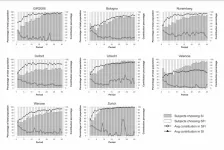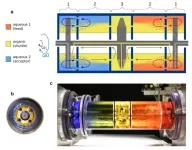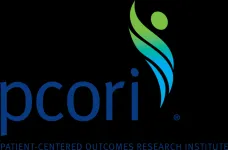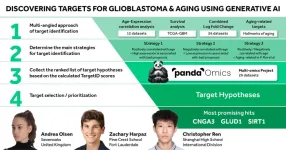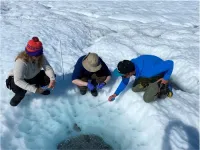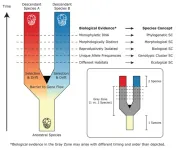(Press-News.org) The American Society for Biochemistry and Molecular Biology sent recommendations to the National Institutes of Health on April 14 to improve working conditions for postdocs.
The society recommended that the NIH:
Ensure a livable wage, benefits, etc. for postdocs
Require that principle investigators help postdocs craft a training plan
Require that principal investigators complete mentor training programs
Expand programs to create more academic staff scientist positions
Collect data on postdoc career outcomes
“Many of our members who run labs are struggling to recruit and retain qualified postdocs,” Sarina Neote, public affairs director of the ASBMB, said. “We are glad the NIH asked for the community’s input, and we hope it will lead to better treatment of postdocs, who are a critical part of the American scientific enterprise.”
The ASBMB’s statement comes during what some in academia are calling a “postdoc shortage.” A survey by Science magazine found that three-quarters of principal investigators reported challenges recruiting qualified postdoc candidates. Furthermore, a Nature survey revealed that postdocs experience great distress with their workload and workplace culture.
Postdocs are often underpaid, leading them to struggle to meet their basic needs, such as housing and medical expenses. The ASBMB claimed that challenges such as these and lack of health insurance, childcare access and childcare funds, retirement plans and more can make postdocs feel isolated and threaten their quality of life. The society urged NIH to provide more basic benefits as well as resources to support mental health.
“Mitigating a few of these challenges would go a long way in increasing recruitment, retention and quality of life for postdoctoral researchers,” the society wrote.
In addition, becoming an academic principal investigator requires enormous sacrifices such as time away from family and constantly searching for funding, which some postdocs are not willing to bear.
“Graduate students and postdocs observe their advisers and peers struggling and become increasingly unwilling to pay the opportunity cost required to secure faculty positions that are outrageously competitive and have few perks in comparison to the challenges,” the society wrote.
Due to the temporary nature of a postdoc position, postdocs are often overworked in the laboratory without clear goals or time for professional development. “NIH should require postdoctoral training plans that detail anticipated timelines for publications, grant submissions and other milestones, and agreed upon percent effort between professional development, mentored research, and independent research,” the ASBMB wrote
However, this requirement may present a challenge for many principal investigators because they are not formally trained in mentoring. The ASBMB recommended that principal investigators undergo formal mentorship training to be eligible for NIH grants in order to help them develop training plans with their postdocs.
As the number of students earning Ph.D. degrees increases, many postdocs who want to stay in academia fail to find all types of academic positions after completing their training. The ASBMB suggested that NIH expand programs such as the National Cancer Institute’s R50 Research Specialist Award to all institutions in order to provide more academic positions for qualified researchers such as staff scientist jobs.
The society also said that pursuing an academic postdoc often does not lead to increased career trajectory or salary.
“The value of pursuing a postdoc for nonacademic careers is not well quantified.” The society encouraged the NIH to collect and disseminate data on career outcomes, such as salary and position level, of graduate students as well as postdocs to help them make informed career decisions.
About the American Society for Biochemistry and Molecular Biology (ASBMB) The ASBMB is a nonprofit scientific and educational organization with more than 12,000 members worldwide. Founded in 1906 to advance the science of biochemistry and molecular biology, the society publishes three peer-reviewed journals, advocates for funding of basic research and education, supports science education at all levels, and promotes the diversity of individuals entering the scientific workforce. For more information about the ASBMB, visit www.asbmb.org.
END
ASBMB calls for better wages and benefits for postdocs
The society urges the NIH to require institutions to provide basic benefits, training plans and professional development for them
2023-05-02
ELSE PRESS RELEASES FROM THIS DATE:
Cooperation benefits from peer-punishment
2023-05-02
A multi-lab replication of a 2006 study supports the role of peer sanction in promoting human cooperation. Cooperation is imperative for society to successfully solve complex problems, including climate change. One approach many groups have adopted is a system of peer sanctions for noncooperators. Such a system incurs costs to participants, who must impose the sanctions, but can allow cooperators to feel more secure that their investments in the shared project will be matched by others. A 2006 study suggested that groups with peer sanctions outgrew and outperformed groups without a peer-sanctioning institution. In light ...
Recycling of valuable metals from spent lithium ion batteries using spinning reactors
2023-05-02
In a world that is slowly distancing itself from carbon-based energy, there has been a meteoric rise in the use of lithium-ion batteries as a next-generation energy storage solution. However, this has resulted in another problem - an increase in the amount of lithium battery waste. Lithium-ion batteries degrade slowly over their lifetime, losing anywhere from 12% to 24% of their total capacity over 500 charging and discharging cycles. The electrolyte and other materials inside the battery can also degrade, causing a decrease in capacity over time. The disposal of lithium batteries ...
PCORI offers up to $452 million through new health research funding opportunities on high-priority topics
2023-05-02
WASHINGTON, D.C. – The Patient-Centered Outcomes Research Institute (PCORI) today began inviting proposals for new studies and implementation projects through nine funding opportunities. These PCORI Funding Announcements (PFAs) include four offering up to $452 million for comparative clinical effectiveness research (CER) studies comparing health care approaches to help patients and their caregivers make better-informed health choices given their particular circumstances. Additional PFAs offer funding for a range of projects that support and advance patient-centered CER and use of PCORI-funded research results.
“With ...
Could wearables capture well-being?
2023-05-02
New York, NY (May 2, 2023)—Applying machine learning models, a type of artificial intelligence (AI), to data collected passively from wearable devices can identify a patient’s degree of resilience and well-being, according to investigators at the Icahn School of Medicine at Mount Sinai in New York.
The findings, reported in the May 2nd issue of JAMIA Open, support wearable devices, such as the Apple Watch®, as a way to monitor and assess psychological states remotely without requiring the completion of mental health questionnaires.
The ...
High school student researchers find new brain tumor drug targets using AI
2023-05-02
Three high school students – Andrea Olsen from Oslo, Norway; Zachary Harpaz from Boca Raton, Florida; and Chris Ren from Shanghai, China – co-authored a paper using a generative artificial intelligence (AI) engine for target discovery from Insilico Medicine (“Insilico”) called PandaOmics to identify new therapeutic targets for glioblastoma multiforme (GBM). GBM is the most aggressive and common malignant brain tumor, accounting for 16% of all primary brain tumors. The findings were published on April 26 in the journal Aging.
Olsen, a student at Sevenoaks School in Kent, UK, began interning at Insilico Medicine in 2021, after discovering ...
More than 5,000 tons of toxic chemicals released from consumer products every year inside homes and workplaces
2023-05-02
People often assume that the products they use every day are safe. Now a new study by Silent Spring Institute and University of California, Berkeley exposes how much people come into contact with toxic ingredients in products, used at home and at work, that could harm their health. Findings from the analysis could help state and federal agencies strengthen chemical regulations and guide manufacturers in making safer products.
Many common products like shampoos, body lotions, cleaners, mothballs, and paint removers contain toxic volatile organic compounds or VOCs—chemicals that escape as gases, accumulate in indoor air, and cause a variety of health ...
Researchers discover that the ice cap is teeming with microorganisms
2023-05-02
There are no plants, and only very few animals: people rarely come here. The large glaciers in Greenland have long been perceived as ice deserts. Gigantic ice sheets where conditions for life are extremely harsh.
But now, it seems, we have been wrong. There is much more life on the glaciers than we thought.
Headed by Professor Alexandre Anesio, a group of researchers from the Department of Environmental Science at Aarhus University have discovered that the glaciers are teeming with life. Microbes that have adapted to ...
Behavior patterns of people who achieve clinically significant weight loss
2023-05-02
COLUMBUS, Ohio – A new study analyzing data on over 20,000 U.S. adults links a healthier diet and increased exercise to weight loss that reduces heart disease risk – while associating skipping meals and taking prescription diet pills with minimal weight loss, weight maintenance or weight gain.
For many in the study sample, however, losing a “clinically significant” 5% of their body weight did not eliminate their risk factors for cardiovascular disease, results showed. In fact, the average ...
Accelerating coral reef science: building consensus around the assessment and interpretation of Symbiodiniaceae diversity
2023-05-02
New research published in PeerJ Life and Environment by Dr. Sarah Davis and sixty-one scientists from 12 countries presents a perspective to build consensus around the assessment and interpretation of Symbiodiniaceae diversity. Symbiodiniaceae is a family of marine dinoflagellates (plankton) notable for their symbiotic associations with reef-building corals, sea anemones, jellyfish, marine sponges and other marine invertebrates. Understanding Symbiodiniaceae is important to those working to protect and regenerate coral reefs that are under threat around the world.
"The authors hope this paper will provide a springboard to launch ...
The International World Wide Web Conference selects Seoul Test of Time Award
2023-05-02
The International World Wide Web Conference Committee (IW3C2) announced today that the 2023 Seoul Test of Time Award will be presented to the authors of the paper “A Contextual-Bandit Approach to Personalized News Article Recommendation;” Wei Chu, (Ant Group), Lihong Li, (Amazon), John Langford, (Microsoft) and Robert Schapire (Microsoft).
The award will be presented during the opening ceremony of the 32nd international conference in The ACM Web Conference series (formerly known as The International World Wide Web Conference) hosted by the team in Austin. See https://www2023.thewebconf.org ...
LAST 30 PRESS RELEASES:
Scientists show how to predict world’s deadly scorpion hotspots
ASU researchers to lead AAAS panel on water insecurity in the United States
ASU professor Anne Stone to present at AAAS Conference in Phoenix on ancient origins of modern disease
Proposals for exploring viruses and skin as the next experimental quantum frontiers share US$30,000 science award
ASU researchers showcase scalable tech solutions for older adults living alone with cognitive decline at AAAS 2026
Scientists identify smooth regional trends in fruit fly survival strategies
Antipathy toward snakes? Your parents likely talked you into that at an early age
Sylvester Cancer Tip Sheet for Feb. 2026
Online exposure to medical misinformation concentrated among older adults
Telehealth improves access to genetic services for adult survivors of childhood cancers
Outdated mortality benchmarks risk missing early signs of famine and delay recognizing mass starvation
Newly discovered bacterium converts carbon dioxide into chemicals using electricity
Flipping and reversing mini-proteins could improve disease treatment
Scientists reveal major hidden source of atmospheric nitrogen pollution in fragile lake basin
Biochar emerges as a powerful tool for soil carbon neutrality and climate mitigation
Tiny cell messengers show big promise for safer protein and gene delivery
AMS releases statement regarding the decision to rescind EPA’s 2009 Endangerment Finding
Parents’ alcohol and drug use influences their children’s consumption, research shows
Modular assembly of chiral nitrogen-bridged rings achieved by palladium-catalyzed diastereoselective and enantioselective cascade cyclization reactions
Promoting civic engagement
AMS Science Preview: Hurricane slowdown, school snow days
Deforestation in the Amazon raises the surface temperature by 3 °C during the dry season
Model more accurately maps the impact of frost on corn crops
How did humans develop sharp vision? Lab-grown retinas show likely answer
Sour grapes? Taste, experience of sour foods depends on individual consumer
At AAAS, professor Krystal Tsosie argues the future of science must be Indigenous-led
From the lab to the living room: Decoding Parkinson’s patients movements in the real world
Research advances in porous materials, as highlighted in the 2025 Nobel Prize in Chemistry
Sally C. Morton, executive vice president of ASU Knowledge Enterprise, presents a bold and practical framework for moving research from discovery to real-world impact
Biochemical parameters in patients with diabetic nephropathy versus individuals with diabetes alone, non-diabetic nephropathy, and healthy controls
[Press-News.org] ASBMB calls for better wages and benefits for postdocsThe society urges the NIH to require institutions to provide basic benefits, training plans and professional development for them
